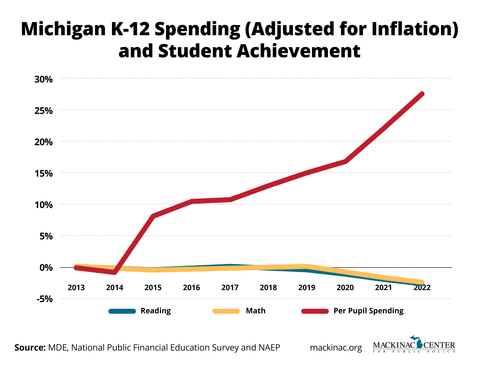More than 60% of Michigan third graders, and nearly 58% of fourth graders, failed the 2025 state reading test – a greater proportion than last year. And all tested grades performed worse than they did just before the pandemic-era lockdowns.
State education leaders say funding and class size are to blame. But poor policy implementation and lack of school accountability are the more likely culprits.
In 2024, Michigan placed 44th in fourth grade reading on the National Assessment of Educational Progress, also known as the Nation’s Report Card – down from 42nd in 2022. The state scored five points below the national average. The NAEP assesses fourth and eighth grade students in reading and math every other year.
The COVID lockdowns can hardly be blamed for today’s downward performance trend among the early elementary grades. In fall 2020, when most of Michigan’s public schools shut their doors to in-person learning, current third and fourth graders had not yet begun formal schooling.
So, what is contributing to the ongoing failure of schools to improve student achievement, especially in these grades?
State education leaders point to school funding and class size as main sources of the problem. But policies that address these are not likely to make a notable difference in student achievement.
State spending per student, when adjusted for inflation, has increased more than 30% since 2013, while student enrollment has dropped. Schools now get an average of $23,700 in funding per pupil. Yet, student achievement has stagnated or declined during this same period.
A shrinking student population coupled with growing staff numbers has resulted in an average of 14 students for every teacher in the state. Lawmakers have introduced legislation that would apply a cap on class size to lower elementary grades in certain schools, claiming that doing so would improve achievement. But education research fails to adequately support claims that smaller class sizes lead to better student outcomes.
Lawmakers ought to pass policies that hold schools accountable for student achievement and improve the implementation of education reforms, if they want to improve student outcomes.
Instead, the state legislature repealed several laws that aimed to improve accountability, before they could be fully implemented and evaluated for their effectiveness. The legislature removed a provision from the Read by Grade Three law that required students to be proficient in reading before advancing to fourth grade. And that provision was never even fully implemented by districts during the four years it was in effect. Many districts used the law’s exemption provision to promote students who were unable to read at a third-grade level.
To be fair, lawmakers recently passed literacy legislation intended to improve reading proficiency, especially in the early elementary grades. Though districts aren’t required to implement the law until 2027, they ought to do so with urgency to prevent students from falling further behind. Reinstating the third-grade retention requirement would improve its likelihood of success.
Mississippi included a retention provision in a literacy law it passed in 2013 and has produced impressive gains in achievement since. By including rigorous accountability standards, Mississippi’s law helps ensure schools provide the interventions needed to support student success.
The Michigan legislature repealed other accountability laws in 2023, too. It eliminated the School Grades law, which rated each school and increased transparency for student performance. The law assigned a letter grade to every public school based on its test scores and other key indicators.
Lansing also watered down the teacher evaluation system that year, making it more difficult for school officials to recruit, retain and reward highly effective teachers. When the previous, more rigorous evaluation system took effect in 2018, most districts failed to implement it with fidelity. An improbably high 98% of teachers were rated effective or highly effective while student achievement plummeted.
Quality teachers have a greater impact on student achievement than any other factor within a school’s control. Policies that tie a strong evaluation system to personnel decisions, such as performance-based pay, layoffs and professional development, ensure that schools retain and reward effective teachers.
Politically popular policies focusing on funding and class size are unlikely to arrest the state’s collapse in reading and math proficiency. Laws that improve school accountability and are implemented effectively will do more to address student achievement.











